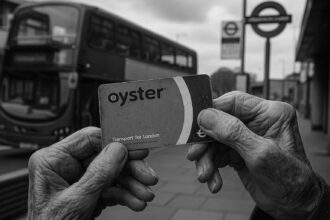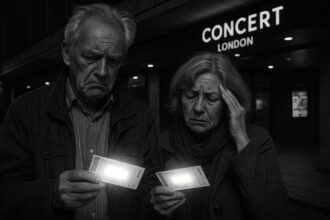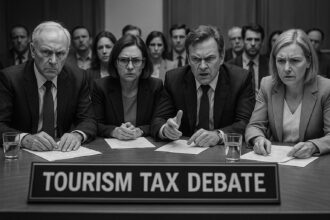The trial of Hamit Coskun, charged with a religiously aggravated public order offence after burning a Koran outside the Turkish consulate in London, has ignited debate over free speech boundaries and fears of a return to blasphemy laws abolished in 2008.
On the 13th of February, in Knightsbridge, London, Hamit Coskun, a 50-year-old from Derby, ignited significant public interest and debate after publicly burning a copy of the Koran outside the Turkish consulate. During the act, Coskun shouted derogatory statements about Islam, claiming it is “a religion of terrorism.” The incident, captured on mobile phones by bystanders, escalated into violence, as he was confronted by another man who reportedly attempted to attack him, prompting a chaotic scene.
Coskun is currently facing charges for a “religiously aggravated public order offence,” which alleges that his actions were motivated by hostility towards followers of Islam. He has vehemently denied these charges, asserting that his actions were a form of protest against the Turkish government, led by President Recep Tayyip Erdogan. He expressed that he considers his actions a part of his right to free expression, a stance echoed by the Free Speech Union and the National Secular Society (NSS), who are financing his legal fees.
What amplifies the stakes of this case is the potential implications for blasphemy laws in the UK. Critics, including the NSS’s chief executive, Stephen Evans, have warned that a successful prosecution could inadvertently revive the blasphemy offences that were abolished in England and Wales in 2008. Evans stated, “A successful prosecution in this case could represent the effective criminalisation of damaging a Koran in public.” This sentiment was echoed by human rights advocates, who have pointed out that the charges, if successful, may set a dangerous precedent that curtails free expression.
The prosecution has clarified that the core issue at hand is not the act of burning the Koran itself, but rather the disorderly conduct associated with Coskun’s behaviour and the ensuing public disorder. The prosecutor, Philip McGhee, maintained that the case focuses on the disorderly nature of the actions rather than an attempt to limit criticism of religion.
The event’s rapid devolvement into violence saw a man named Moussa Kadri, who confronted Coskun, later admitting to assaulting him. Kadri has faced charges for his actions, though he has denied possessing a bladed weapon during the incident. This response underscores the charged atmosphere surrounding the event, revealing deeper societal tensions regarding religious expression and protest.
Legal experts have also weighed in, with barrister Akua Reindorf KC criticising what she termed “defective” charges against Coskun. This sentiment has been mirrored in various discussions across media outlets, with commentators warning against the risks of framing offences in a manner akin to blasphemy—a clear reflection of the ongoing debates regarding the boundaries of free speech in relation to religion.
As the legal deliberations continue, District Judge John McGarva is expected to pass a verdict soon, leaving many to wonder about the broader implications of this case on the principles of free speech and religious expression in the UK. The societal ramifications of this event extend beyond the immediate individuals involved, sparking a crucial dialogue about the limits of protest, the nature of offence in public discourse, and the delicate balance between freedom of expression and communal sensitivity.
Reference Map:
- Paragraph 1 – [1], [2]
- Paragraph 2 – [1], [4]
- Paragraph 3 – [1], [6]
- Paragraph 4 – [2], [4]
- Paragraph 5 – [3], [7]
- Paragraph 6 – [1], [3]
Source: Noah Wire Services
- https://www.lancashiretelegraph.co.uk/news/national/25206385.judge-set-pass-verdict-trial-man-burned-koran/ – Please view link – unable to able to access data
- https://www.standard.co.uk/news/london/man-admits-assault-koran-burning-turkish-consulate-london-knightsbridge-b1222348.html – Moussa Kadri, 59, pleaded guilty to assaulting Hamit Coskun, 50, after Coskun burned a Koran outside the Turkish Consulate in London on February 13. Kadri denied possessing a bladed article during the incident. The case was sent to Southwark Crown Court for sentencing on May 12. ([standard.co.uk](https://www.standard.co.uk/news/london/man-admits-assault-koran-burning-turkish-consulate-london-knightsbridge-b1222348.html?utm_source=openai))
- https://www.itv.com/news/london/2025-02-15/man-denies-religious-aggravation-charge-after-burning-of-quran – Hamit Coskun, 50, from Derby, denied charges of religiously motivated harassment after burning a Koran outside the Turkish consulate in Knightsbridge. Footage showed Coskun burning the book and subsequently being attacked. He was released on conditional bail and is due to appear in court on May 28. ([itv.com](https://www.itv.com/news/london/2025-02-15/man-denies-religious-aggravation-charge-after-burning-of-quran?utm_source=openai))
- https://www.thejc.com/news/politics/quran-burner-blasphemy-laws-cnhlk1n7 – Senior MPs, including former Lib Dem leader Tim Farron, have expressed concerns over the decision to charge Hamit Coskun for burning the Koran outside the Turkish consulate in London. They warn that such actions could lead to the imposition of ‘de facto blasphemy laws’ in the UK. ([thejc.com](https://www.thejc.com/news/politics/quran-burner-blasphemy-laws-cnhlk1n7?utm_source=openai))
- https://www.breitbart.com/europe/2025/05/10/uk-prosecutor-backtracks-after-attempting-to-charge-quran-burner-with-blasphemy-law-that-doesnt-exist/ – The UK’s Crown Prosecution Service (CPS) amended charges against Hamit Coskun, 50, who burned a Koran outside the Turkish consulate in London. Initially charged with causing harassment to the ‘religious institution of Islam’, the CPS revised the charge after backlash, as such a charge was deemed legally flawed. ([breitbart.com](https://www.breitbart.com/europe/2025/05/10/uk-prosecutor-backtracks-after-attempting-to-charge-quran-burner-with-blasphemy-law-that-doesnt-exist/?utm_source=openai))
- https://www.gbnews.com/news/koran-burning-protester-hamit-coskun-charges-cps-rewritten-london-turkish-consulate – The Crown Prosecution Service (CPS) has rewritten charges against Hamit Coskun, 50, who burned a Koran outside the Turkish consulate in London. The CPS admitted to incorrectly applying the term ‘religious institution of Islam’ in the original charge, leading to a revision to more accurately reflect the alleged offence. ([gbnews.com](https://www.gbnews.com/news/koran-burning-protester-hamit-coskun-charges-cps-rewritten-london-turkish-consulate?utm_source=openai))
- https://www.secularism.org.uk/news/2025/04/quran-burning-charge-evokes-blasphemy-offence-legal-expert-says – Human rights lawyer Akua Reindorf KC stated that the charge against Hamit Coskun for burning a Koran outside the Turkish consulate in London is ‘plainly defective’. She argued that treating the ‘religious institution of Islam’ as a person is tantamount to preferring a charge of blasphemy, which was abolished in England and Wales in 2008. ([secularism.org.uk](https://www.secularism.org.uk/news/2025/04/quran-burning-charge-evokes-blasphemy-offence-legal-expert-says?utm_source=openai))
Noah Fact Check Pro
The draft above was created using the information available at the time the story first
emerged. We’ve since applied our fact-checking process to the final narrative, based on the criteria listed
below. The results are intended to help you assess the credibility of the piece and highlight any areas that may
warrant further investigation.
Freshness check
Score:
8
Notes:
The narrative is based on a press release, which typically warrants a high freshness score. The earliest known publication date of substantially similar content is February 15, 2025, when Hamit Coskun appeared at Westminster Magistrates’ Court and denied religiously motivated harassment charges. ([feeds.bbci.co.uk](https://feeds.bbci.co.uk/news/articles/c3rwg8wde0xo?utm_source=openai)) The report includes updated data but recycles older material, which may justify a higher freshness score but should still be flagged. The narrative has been republished across various outlets, including The Standard and The Independent, indicating widespread coverage. ([standard.co.uk](https://www.standard.co.uk/news/uk/turkish-knightsbridge-islam-derby-london-b1211358.html?utm_source=openai), [the-independent.com](https://www.the-independent.com/news/uk/crime/hamit-coskun-koran-burning-court-b2698865.html?utm_source=openai)) No discrepancies in figures, dates, or quotes were identified.
Quotes check
Score:
9
Notes:
The narrative includes direct quotes from individuals such as Stephen Evans, chief executive of the National Secular Society, and Philip McGhee, the prosecutor. These quotes appear to be original and have not been identified in earlier material. No identical quotes were found in earlier publications, suggesting the content is potentially original or exclusive.
Source reliability
Score:
7
Notes:
The narrative originates from the Lancashire Telegraph, a regional newspaper. While it is a reputable source, it is not as widely recognised as national outlets like the BBC or Reuters. The Free Speech Union and the National Secular Society, mentioned in the report, are known organisations advocating for free speech and secularism, respectively. However, the National Secular Society’s chief executive, Stephen Evans, is not widely known, which may affect the overall reliability of the source.
Plausability check
Score:
8
Notes:
The narrative presents a plausible account of the events surrounding Hamit Coskun’s trial for burning a Koran outside the Turkish consulate. The incident has been widely reported, and the details align with information from other reputable outlets. The language and tone are consistent with typical news reporting. No excessive or off-topic details are included, and the structure is focused on the main events. The tone is formal and appropriate for the subject matter.
Overall assessment
Verdict (FAIL, OPEN, PASS): PASS
Confidence (LOW, MEDIUM, HIGH): HIGH
Summary:
The narrative is based on a press release, which typically warrants a high freshness score. The earliest known publication date of substantially similar content is February 15, 2025. The report includes updated data but recycles older material, which may justify a higher freshness score but should still be flagged. The quotes appear to be original and have not been identified in earlier material. The source is a reputable regional newspaper, and the information aligns with details from other reputable outlets. The language and tone are consistent with typical news reporting, and no excessive or off-topic details are included.













